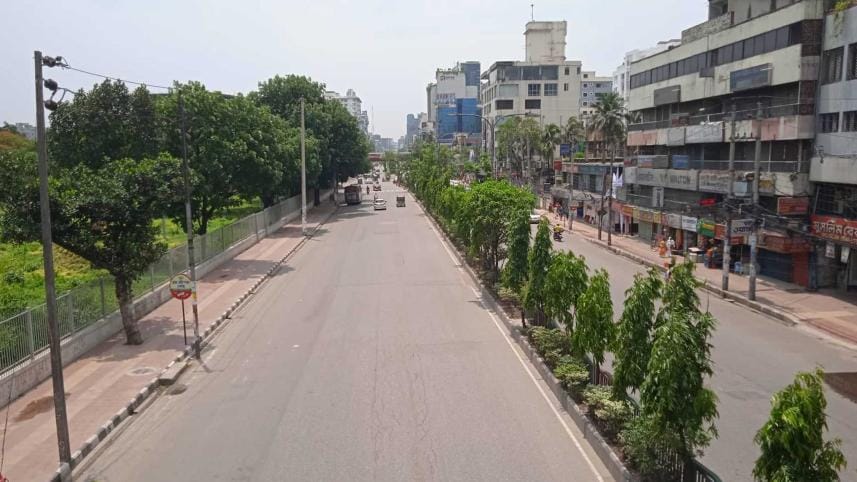The Fantasy of an Empty Dhaka

One recurring discourse in Dhaka, especially before and after Eid holidays, is that of an "empty" city. From newspaper headlines and advertisements to personal posts on social media, this invocation of an unpeopled or rather uncrowded city seems ubiquitous, one pushed by both those who leave and those who stay back.
The famous jingle of Grameenphone—"shopno jabe bari amar" ("My dreams will go home")—captures the emotions of homegoers pretty well. No wonder it has struck a chord with them, becoming a popular score accompanying narratives and photos of their long journey home. The song traces the "journey" of a dream that necessitates dislocation in the first place. It also depicts the dreamer's emotions of being pulled apart from their loved ones and familiar world, after having arrived in an alien, faraway city, and the joy of eventually going back, made more intense by an excruciatingly long wait. This great exodus is represented as a necessary experience, tinged with the hope of going "back" to their roots from the temporary sojourn, i.e. the city, a location which in turn bears the ring of an unfamiliar, if not outright hostile, terrain. Hence, being away from it is rejuvenating and the journey back worthwhile. The unbound happiness perceived in the homegoers also implies a release—from everything antagonistic that this city has come to be associated with.
What intrigues me most, however, is the second part of the discourse related to those who stay behind. Despite the ominous vibes that being left behind usually ignites, they are actually the happier lot here, jubilant at the prospects of an empty city, left to them only. While one group leaves it, the other relishes the unusual desert—or non-city—that Dhaka would become because of the former's departure.
This pleasure of having the city to oneself, albeit temporarily, warrants some consideration. Why are they happy to be left alone? What is a city without its crowd? Do they really want an abandoned city with half its population gone? This celebration of the phaka Dhaka is as empty a rhetoric as the phantasmagoria of the barrenness itself. In this waltz with the city, its citizens will continue to ebb and tide, their constant dislocation aestheticised in the form of dreams that no one has any real intention to decipher or even to engage with critically.
Simply put, what this means is that most of us do not have the prospects of a good job, standard schools for children, and places to nurture our dreams outside the capital—which happens to be a primate city in terms of its lopsided magnitude and economic, cultural, and political significance compared to other cities of the country. Hence, chasing one's dreams necessarily involves a dislocation which, like any dislocation, has consequences. Despite the impression of a happy homecoming, there is nothing desirable about this seasonal departure. Let's not forget that the people leaving the city constitute half of its population, and the "home" referred to is tangible elsewhere. They have all flocked to Dhaka to pursue their dreams. They have a strategic relationship with this city. The city in turn needs them for its service sector to function. If Dhaka doesn't feature in their emotional graph to yield a mutually fostering relationship, can you blame them?
Most importantly, what this biannual pilgrimage nurtures is a sense of us vs. them, which is detrimental to the wellbeing of the city. The fantasy of a phaka Dhaka is a manifestation of an unhealthy pleasure we partake in at the expense of those we have marked as not-us. The reiteration of this rhetoric solidifies this fissure. When a city is liveable for a span of only seven to 10 days, and that too after sending half its population away, it suggests that something is rotten in its state of being. We need to ask what made this experience—this living away from one's home, tangibly present and accessible yet unliveable due to lack of resources—a standard experience here. Most importantly, we need to remind ourselves that it doesn't have to be so! Dhaka's status as the primary node in all networks has only grown stronger over the years. Hence, coming to Dhaka is not a choice, but a necessity. Both popular and official narratives of the city help buttress this image of the city as the most desired place to be.
Sara Ahmed's reading of emotion as relational and social comes to mind. In her book The Cultural Politics of Emotion, she says that our emotion towards something belongs to a general economy of feelings where they circulate in a cultural setting giving certain thing a certain meaning. Following Ahmed, the emotions we have created for Dhaka, with those big epithets and attributions, have relentlessly contributed to the creation of certain relations of "towardness" (to borrow Ahmed's words), and worse, we have then allowed them to fester. Who needs a primate city anyway? It's a problem and not a medal to boast of! On the contrary, some feelings of "awayness" (again Ahmed's term) from Dhaka was in order, for its own good! We better start dispersing the resources outside the capital, and help create emotions in a reverse relation.
As long as we cherish the few days of easy mobility, fresh air, and available public transport without probing its hollowness, it means we have no means or intention of having our problems solved. Thus, the fantasy of a phaka Dhaka is a syndrome of things not right, and we better stop fetishising it.
Tabassum Zaman, PhD, is an associate professor of English at the University of Liberal Arts Bangladesh (ULAB).



 For all latest news, follow The Daily Star's Google News channel.
For all latest news, follow The Daily Star's Google News channel.
Comments